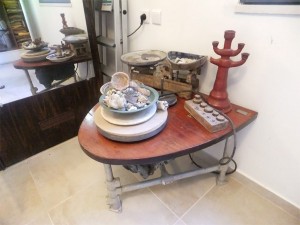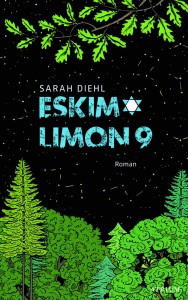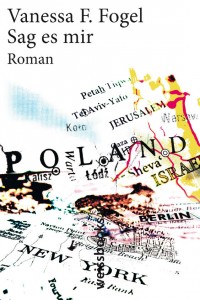An Appeal for Recognition and Dignity
“We used to throw stones at her – we thought she was a witch.” With these words, a former resident of Rishon LeZion ruefully told me of her childhood encounters with the sculptor and doll maker, Edith Samuel. Edith wore her long, dark, European skirts under the searing Middle Eastern sun and suffered from a physical deformity. The daughter of a liberal German rabbi, Edith and her sister Eva were both artists who left their home city of Essen in the 1930s and immigrated to Palestine.

The pottery wheel belonging to Paula Ahronson, Eva Samuel’s business partner, is preserved in private hands and untouched since her death in 1998
© Jewish Museum Berlin, photo: Michal Friedlander
The Samuel sisters worked long hours, struggled to earn a living and did not gain the recognition that they deserved, during their lifetimes. The exhibition “Tonalities” at the Jewish Museum Berlin aims to bring forgotten women artists back into the public arena. It presents Eva Samuel’s works and that of other women ceramicists who were forced to leave Germany after 1933.
My search for transplanted German, Jewish women in the applied arts began many years prior to my encounter with the Samuel sisters. It was Emmy Roth who first captured my attention. Born in 1885, Roth was an exceptionally talented and internationally successful silversmith, who worked in Berlin. She immigrated to Palestine and fell into obscurity, ultimately taking her own life in 1942. Her male refugee colleagues, Ludwig Wolpert and David Gumbel, were appointed to teach metalwork at the Jerusalem New Bezalel School of Art in the late 1930s. They are feted in Israel today, whereas Roth is still completely unknown there. → continue reading
When German friends of mine choose to move from Darmstadt, in Hesse, into the surrounding countryside, I shake my head in disbelief. That an Israeli family would leave Tel Aviv not, as many Israelis do, to move to Berlin (see the German-language blog post offering ten tips for Israelis in Berlin), but rather to the tiny Hessian town of Niederbrechen, seems audacious, if not outright absurd. This scenario, however, is the starting point of Sarah Diehl’s debut novel Eskimo Limon 9. The novel depicts a “very particular kind of culture clash,” as the book’s flap announces.

Book cover
© Atrium publishers
Some of the characters are Israelis, and they have little interest in discussing Germany’s past or the history of European Jews.
“The only thing in the Jewish Museum that will remind me of home will probably be the metal detector you have to go through at the entrance.”
The novel’s Israeli father Chen wishes Germans “would associate us with Eskimo Limon instead of six million dead.” The title of the book refers to a film series of the same name, which aired in Germany in the 1980s as Eis am Stil (Popsicle), “one of the few Israeli pop culture phenomena […] familiar to German audiences.” Many assume that the series is Italian, which—as the author of the novel argues—shows how selective Germans’ perception of Israel can be, and how limited their idea of Jewishness often is.
Other characters are natives of Niederbrechen. → continue reading
or “Being who I am”
“The night before I fly to Germany to see my grandfather Mosha, I meet someone, take him home with me, and for the first time in my life, I sleep with a man.”

© weissbooks.w
Frankfurt am Main
This sentence begins the first chapter of the 2010 novel Sag es mir (Tell it to me) by Vanessa F. Fogel. The author was born in 1981 in Frankfurt and grew up in Israel. She introduces the first-person narrator of this autobiographical novel both as a granddaughter and as a confident young woman right from the start. And despite her imminent trip to the sites of extermination – she meets her grandfather in Berlin and they travel together to Poland – her emphasis is on vitality and the joys of living.
The Frankfurt publishing house weissbooks has now taken on another Jewish writer of “the third generation.” Channah Trzebiner is a lawyer, also born in 1981 in Frankfurt, where, unlike Fogel, she still lives. She has written Die Enkelin (The Granddaughter), which is more of “a kind of inner monologue” than a novel. This book also begins confidently: “I accept the woman that I am.” At once, however, the author alerts her reader to the difficult process underlying this claim:
“For years I cut off my connection to the innermost ‘I’ […], so that I could be the substitute for a life ended by murder. How I could have done otherwise? I’m called Channah after my grandmother’s youngest sister […].”
→ continue reading


